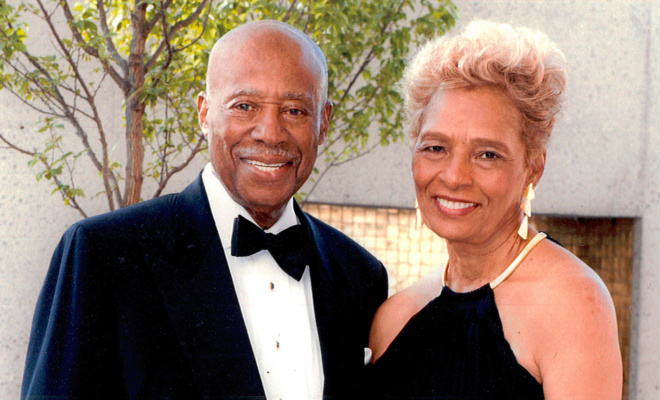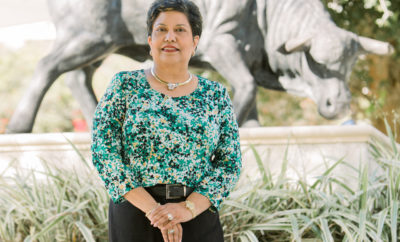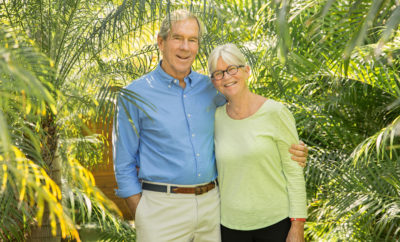
People
Scenes from an Interview
Bernard Watson – Scenes
Educated to Be the Best
by Gus Mollasis
One needs only to look at his impressive resume to see that he’s done a lot with his life. As Chairman of the Board of Trustees of the Barnes Foundation, he oversaw one of greatest private art collections in America. He’s also served as President and CEO of the William Penn Foundation in Philadelphia, as well as Professor of Urban Studies and Urban Education and Academic VP of Temple University. Many accomplishments to be sure, but all taken in stride by this humble man named Bernard Watson.
Growing up during the Depression, he learned to count his blessings, while seizing every opportunity that came his way. A strong desire to learn helped him earn a PhD from the prestigious University of Chicago. He would be named to three Presidential Commissions serving Carter, Clinton and Bush, Sr. Having penned numerous books, including his memoir Colored, Negro, Black; Changing the American Dream, his fight for civil rights has been made with the same determination and dignity of both Rosa Parks and Mrs. Martin Luther King, two iconic civil rights leaders he’s met along the way.
If Dr. Bernard Watson’s life were a film, the score would sound jazzy with lots of ups and some downs. There’d even be a patriotic theme filled with some disruptive horns to show both pride and pain in this man’s life featuring numerous awards, service to his country, and his ascent into higher ranks of top learning institutions. Perhaps most importantly, there would be some sharp-sounding notes symbolizing him as an unsung civil and education rights champion fighting for the rights of blacks, whites and everyone else who make up the fabric in his America. No doubt there would also be some sad notes to remember the loss of his daughter to cancer, whose bright spirit lives in him today. Scenes
Be the Best Scenes
In Dr. Watson’s America, children shine brightest when they take the reins and responsibilities of their own life, and seize opportunities afforded by our living in America. “Be the best,” are words of wisdom and encouragement that still echo in his heart, emanating from his real-life heroes — his mom and dad. As I sat down with this man of letters, I thought I could hear the sound of a faint tenor sax playing in the background and I couldn’t wait to learn as I took a look at some scenes from an interview of his life.
Where were you born?
Gary, Indiana.
What’s the most important thing you learned from mom and dad?
To be the best. In my time, when I grew up and was raised, there were very few opportunities and we were all aware of that. We should be prepared to take advantage of any opportunities by not letting any obstacles get in front of us, by being the best. If you’re the best, you can get through them, over them, around them and under them.
I was the fourth of five children, and our parents encouraged all us to get an education and go through life with that attitude. My dad, Homer, a World War I combat veteran, had a third-grade education, and my mother, Fannie, graduated from college magna cum laude at 17. What we learned from mom and dad was that things were not fair. In this country, black people don’t get treated the same as other people. There are all kinds of obstacles put in front of you, but that should not stop you from doing the things that you want to do. To do that, you have to work hard, be good, and you have to try to be the best in whatever you do because you have to be twice as good as a person who is not black. Scenes
Please recall a memory from your childhood that you will never forget.
The War and the Great Depression. I was born a year before the Great Depression started. My second job with my older brother was taking a wagon that my father built and we went to the surplus distribution center set up by the Department of Agriculture all over the country. People could pick up fruit, corn meal, flour and perishable items that were given to them for free. We would go there and as people came out, we would offer to take their food in our wagon to where they lived. They in turn would give us a dime or 20 cents. That was one of my first jobs.
There is an incident in 1949 at Indiana University, a turning point in your life that thrust you into becoming a passionate voice for racial equality. Please take me back there.
That was a critical moment for me, but it didn’t turn me into anything. I was that way before I got there. I was president of the freshman and sophomore class, vice president of the student government, a sports editor, and president of the chemistry club and the Spanish club. I was involved in everything. We had a big school and I loved school. When I went to Indiana University, blacks could not live on campus. Understand that I was there with the veterans of the War who had enlisted, black men who had been pilots and officers, and they could not live on campus. Veterans. No blacks could live on campus. We finally got that cracked.
There was a special dorm where the first blacks lived. We didn’t get the black women on campus until two years later. I was very active in that kind of thing. You could never have anybody run for office because that was all run by the fraternities and organized groups. I read all the rules and there was a little paragraph in there that said there could be a minority representative. They didn’t mean us. They were talking about foreign students — African students and Asian students. All those people were there. But it didn’t say that so I filed to run for the government under that ruling. They had to put me on the ballot and I won. I was the only black in student government at Indiana University and they had 14,700 students. Scenes
But the point you’re referring to is when our fraternity bought a house in a white neighborhood. We moved into the house and didn’t say a word, because the campus didn’t want to recognize another black organization. The house was set on a little hill, and we got this big sign for our fraternity and put it out front. That’s when the people knew that we were there. The top athletes all had to live off campus until we made our move.
One night I was walking home after class about two blocks from the fraternity house. I noticed this car slowly following me. I kept watching it out of the side of my eye. A block before the frat house, the guy pulled up in front of me and he got out of the car. He was a cop. He put a gun right under my nose and said, “Now listen to me you %#$@&!, we know who you are so we can blow your black ass away.” The only thing that I thought about was, “I’m not going to lose control.” I just looked at him. I didn’t say a word. I didn’t change expression. We knew how to deal with police. Every black father teaches his son how to deal with the police. He got back in the car and left and I kept on walking to the fraternity house. Scenes
How did that incident change you?
It didn’t change me very much. It just confirmed what I already knew about blacks and police and how to handle yourself. That was the main thing – stay alive. Don’t antagonize or confront anybody who has a gun. I didn’t say a word.
What’s the greatest lesson you hope that whites and blacks in America take away from your memoir Colored, Negro, Black; Changing the American Dream? And do you think it’s the same thing? Scenes
I don’t think it’s the same thing. What I’m doing in this book is setting the context of a time when I grew up, and what was happening to me at each stage in my life, so people can see what it means on a personal basis for people my age, my generation and those circumstances. It gives not only white people, but black people and other people an idea of what it was like. It’s not a sociological look as much as it is a personal look at what I went through during these times. I just want people to read it and understand how one person handled that kind of situation. Other people could handle it a different way, but this is how I handled it. I never intended to write that as a book, but my children said, “As close as we are, we don’t know anything about you when you were our age.” I promised them I would put things down and it just kept growing to the point where it became a book. I remember after my late daughter read half a chapter, she got up and walked out of the room, with tears in her eyes, saying, “As close as we are, I learned more about you as a person, just from that, then in all of the years that I’ve known you.”
Finish the following sentences:
A good education is important because… It’s a passport to the future.
When Barack Obama was elected President… I was stunned that we would have an African American president during my lifetime.
My greatest quality is my ability to… Pursue. Persevere. And work harder than most people.
Something I need to work on is… Everything.
If I could do one thing for the youth of the United States it would be to… Convince them that they are in charge of their future more than any other person.
In my life, I’m most proud of… My family.
In my time at Temple University I learned that… That institutions can change.
When I served with the William Penn Foundation I was most grateful for… The opportunity to carry out the values of the people who founded that because they coincided with mine.
The Barnes collection is in better place because… It is available.
I can sleep well at night because I know that in my life I have… Been lucky.
As an educator, what is it that all kids and young students need more than anything to be successful?
What they need to know is that they are in charge of their lives. That’s the most important part. They come from different circumstances, some more difficult, some awful, some very privileged, but that does define who you are what you can be. You have to decide. We all need encouragement, but you must decide what you want out of life, and then you have to work your ass to go get it. All the while, you must understand there are going to be people trying to stop you from doing it, people who’ll try and test you, people who will divert you, and some who will do all they can to try to make the decision for you. You can’t let that happen. You have to pursue your destiny.
What is the one thing you would do to improve America’s educational system?
The biggest investment that this country can make is in its youth. The best way to make that bet in your favor is to have an informed and educated youth, because they’re going to inherit this country whether we want them to or not. We’re going to die and they’re going to be here. What kind of country we leave them in large measure will help determine what kind of country they can shape and make better. They’ll have the tools to do that with an understanding of what this country is, how it has changed, what it was, and their role in shaping its future.
What is the seminal thing you learned by serving in the Korean War, which you have said had a profound impact on your life? Scenes
Service. That’s what you owe your country. I had a college degree. I was not drafted. I volunteered for Korea. It was not about a wonderful patriotism, although that was part of it, because my dad had served, as did my older brother. It’s what you owe your country. But there were other advantages in serving. You got a GI Bill out of this. You got to test yourself against other people under stringent conditions. Whatever you decided to do after that would be an asset to you. I believe in the draft. When people know that they and their family are at risk with wars or whatever this country has to face, they have a very different attitude than when everybody is a volunteer. I want everybody to have that kind of investment and risk. Everybody has skin in the game.
What was the driving force for you attaining a PhD from the University of Chicago?
I always knew that I was going to do that. I started out to be a lawyer, not because I thought about it, but because everyone expected me to be one. I wound up leading things. I was a debater. In those days, you didn’t have a whole lot of black lawyers or doctors. I was going to do that until I was a senior in college. I loved learning and Chicago was my kind of school. People from my all-black high school had gone to the University of Chicago in the 1930s because they could commute from Gary. Chicago let you in whether you qualified or not. They didn’t care if you were black or anything else. The rules were the same. By that time, when I went for my PhD, I had developed such an academic record that I got a fellowship there. I loved every minute I was there. This is what Chicago does. They lay it all on what it takes to get the PhD and then they leave you alone. If you need help, you go get it. They treat you like an adult. I love that place.
You have just returned from the National Museum of African History in Washington, DC. Please tell me about your initial reaction.
Absolutely amazing. Not only the structure, but the way it’s organized. You start in the basement. What it does is start you off with the whole history of slavery worldwide and then it builds in different periods. By the time you get to the fourth level, you’re in the modern day. There is no way you can see everything in two or even three days. It absolutely exceeded my expectations.
What is the one thing that you want everyone in America to see when they visit the Museum?
It’s the entire experience. For many people, including African-Americans, but especially white Americans, they’re afforded the chance to see a history that almost none of them were taught, because it was not written. John Hope Franklin and Carter G. Woodson started that whole business of doing that — stating that this is a history that needs to be told because it is American history. That, and its location, is the power of this exhibit. When you go to the top level and look out, you can see every monument from there. Scenes
I love Washington and haven’t been there in while. I used to spend a lot of time there. I was on three Presidential Commissions. I ran conferences for the Congressional Black Caucus when there were only 13 members. I was blown away by the Museum and I was so proud. It shows you how change occurred and how long it took. I never thought, in high school, that we would ever have African Americans doing the thing that they’re doing in the fields that they’re in. The head of American Express and Xerox are African Americans. But that’s not the main thing. At every level, you can see the differences and the strides being made.
Have things gotten better in your opinion? Where are we in our country with regard to race in America in 2017?
Of course we’re better. You can get better as long as you are alive. You have to keep working at it. It’s all about diversity. Almost everybody here came from somewhere else. People forget that when the Italians and Irish first came here there were signs saying, “Irish need not apply.” Things have gotten a lot better but things can still get better.
Your involvement with overseeing, maintaining and eventually securing a new long-term home for the Barnes Art collection has been both hailed and met with criticism. As you look back at that time in your life, what is the greatest thing you accomplished there?
It was a long process. Mr. Barnes’ collection was tucked off in Marion County in his personal home and they wouldn’t let us do a lot. We couldn’t raise funds there. They didn’t want us in the neighborhood bringing people into this exclusive and very wealthy area where they had homes that looked like hotels. They wouldn’t let us raise money. So the foundations said, “We can’t give you money because you can’t raise enough money to operate.” But then out of the blue, we had two visionaries. Pew Charitable Trust and Gerry Lenfest and a third donor, Mrs. Annenberg from the Annenberg Foundation, who volunteered to help. We went to court and asked for two things. First, being able to expand the board from five to 15 people who had money and could help us get money. Second, which took us another year, to get permission to move. Eventually we built a $150 million building that was paid for and had no mortgage where we could house the collection downtown near the Rodin Museum in Philadelphia, which is considered America’s Champs-Elysees. That’s where Mr. Barnes’ fabulous art collection is located. The greatest accomplishment is just that. We put it where people could see it and appreciate it and see it the way Mr. Barnes wanted it seen. As an example, people came up to me and said, “Wow. You cleaned the art.” We hadn’t touch the art. The only difference was we had windows there and we could see the art in the natural light. Many people came up to me, often some of the most vociferous in opposition during the process, and said, “You did the right thing. You were right.”
We have now passed one million visitors since we opened in the new location.
Who are some of your heroes?
My mother and father. They’re my biggest heroes. Because of the way they lived their lives and the way they raised us.
How did you find your way to Sarasota?
One of my former students used to come here and play tennis at The Colony and relax. He told me to come down to Sarasota. We were thinking of the Virgin Islands, but we came down a couple times and met some folks from Philadelphia who raved about it. It’s laid back. What we found out is that it was really a cultural center. At the time, the Jazz Club of Sarasota brought in all the top people and I do like my jazz. We talked about it and I did what any intelligent husband does. I said to my wife. “You decide.” That’s how you stay happily married for 56 years. (Smiles)
How do you and your wife like to spend the day?
My wife is very active here in a number of organizations, especially the West Coast Black Theatre Troupe. So we spend a lot of time going to shows there.
Is it safe to say that music has always been a big part of your life?
Yes, absolutely. (Picks up photo) That’s me — Bernard Watson and his Hungry Five — our band from the military service during the Korean War. This was taken at the officer’s club. (Laughs) We didn’t let anybody in unless they could play an instrument. Music was and always has been important to me and my family.
Many years from now when someone brings up the name Dr. Bernard Watson, what is the first thing you hope they say about you?
My family. ‘He was a family man.’ I have two children. My daughter Barbara was a lawyer. A tennis player. Fluent in French and Spanish. Fearless. She died of breast cancer at 44, which she discovered herself. She went through all the stuff for two years. She knew she was going to die and wrote a play about cancer called Life in the Cancer Lane while she was dying. Her friends put together a foundation when she died and they carry it on today focusing on giving — something called “Barb’s Bags” to help cancer patients. In that bag are all the things that people need who are going through chemo. Barbara discovered what she needed because she had gone through chemo and radiation. Those bags cost $50 and are given to cancer patients in cities where the play is performed. It was performed twice in Sarasota at the West Coast Black Theatre Troupe last year. She was a wonderful person and her beautiful legacy continues. Yes, I’m very proud of family. They mean everything to me.






You must be logged in to post a comment Login